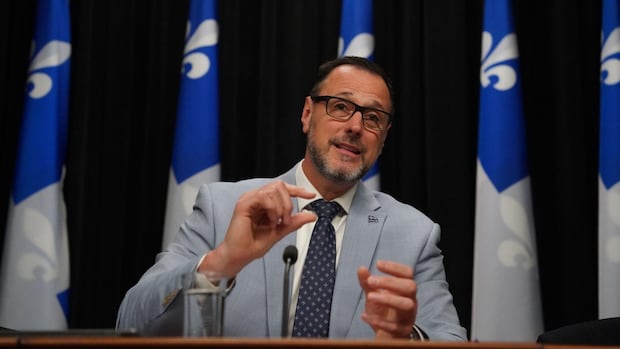The Quebec government intends to present a bill banning prayer in public.
Secularism Minister Jean-François Roberge said in a statement Thursday that the “proliferation of street prayer is a serious and sensitive issue.”
“The premier of Quebec has given me the mandate to strengthen secularism, and I am determined to fulfil this mandate diligently,” he said.
“This fall, we will therefore introduce a bill to strengthen secularism in Quebec, in particular by banning street prayers.”
His statement follows months of efforts by the Coalition Avenir Québec (CAQ) government to reinforce secularism in the province, which includes adopting a law that requires immigrants to embrace the common culture of the province and tabling a bill to expand the province’s religious symbols law to include school support staff.
The statement from Roberge on Thursday provided no details as to how the government would legislate against prayer in public, but Premier François Legault has said his government would not rule out using the notwithstanding clause.
“Seeing people praying in the streets, in public parks, is not something we want in Quebec,” Legault said in December, saying he wanted to send a “very clear message to Islamists.”
“When we want to pray, we go to a church, we go to a mosque, but not in public places. And yes, we will look at the means where we can act legally or otherwise.”
Legault’s CAQ government has been suffering in opinion polls and recently lost its third consecutive byelection to the sovereignist Parti Québécois (PQ).
Legault himself is slated to appear next week at a public inquiry examining the mismanagement of the SAAQclic platform. The platform was intended to digitize some auto insurance board services but it went more than $500 million over budget.
Quebec should focus on ‘solving real problems’
Images of Muslims praying in Montreal made headlines last summer, and, last month, a viral video showing Muslims praying outside the Notre-Dame Basilica of Montreal was shared more than 14,000 times on X.
But members of other faiths also hold public events in Quebec, including the Way of the Cross procession led by the Catholic Archbishop of Montreal on Good Friday.
In a scathing statement, the Canadian Muslim Forum said street prayers are a manifestation of freedom of expression. Banning them, the CMF said, would stigmatize communities and undermine social cohesion.
“At a time when Quebecers are struggling with a health-care system, SAAQclic fiasco, skyrocketing housing costs and rising living expenses, the CAQ government should be focused on solving real problems, not policing the fundamental rights of its citizens,” the statement said.
Paul St-Pierre Plamondon, the leader of the PQ, said he was not opposed to legislation banning prayer in public spaces, but he questioned why it had taken Legault so long to present a law.
“The premier tells us that he has been thinking about the issue of street prayers for a year. Why has he done nothing?” Plamondon said.
The Canadian Civil Liberties Association said banning prayer in public spaces would infringe on freedom of religion, freedom of expression, freedom of peaceful assembly and freedom of association.
“Public spaces belong to everyone, regardless of their religious beliefs,” the association wrote in a statement. “These spaces must be places where diversity of belief, culture and identity is both respected and protected.”
Committee report didn’t recommend public prayer ban
Roberge’s announcement on public prayer also comes just days after an advisory committee recommended the government expand its secularism law, known as Bill 21, to bar early childhood educators in the province’s subsidized daycare network from wearing religious symbols.
The committee, chaired by Guillaume Rousseau and Christine Pelchat, two lawyers that have previously defended Bill 21 in court, did not, however, recommend the government ban prayer in public, suggesting instead that it leave the issue to individual municipalities.
The province’s government-mandated committee on secularism has released its final report. There are 50 recommendations, including prohibiting subsidized daycare workers from wearing religious symbols while on the job.
The committee’s nearly 300-page report, the product of a five-month review, does broach the subject of public prayer, but it says municipalities already have the “necessary competences” to regulate collective street prayer and it says Bill 21 gives them additional powers.
“The committee is concerned about these issues, just as it is concerned about respect for individual freedoms,” the report says.
“Our position is one of moderation, striking a balance between the risks of abuses that run counter to Quebec’s collective values and the preservation of religious practices that do not unduly interfere with public order and respect the purpose of public spaces, which must be accessible to the entire population.”
Nevertheless, Roberge said the committee’s report played a role in the decision to present a new bill banning public prayer.
“Thanks to the discussions in caucus and the committee’s report, our reflections on several aspects of secularism are well advanced,” he said.








